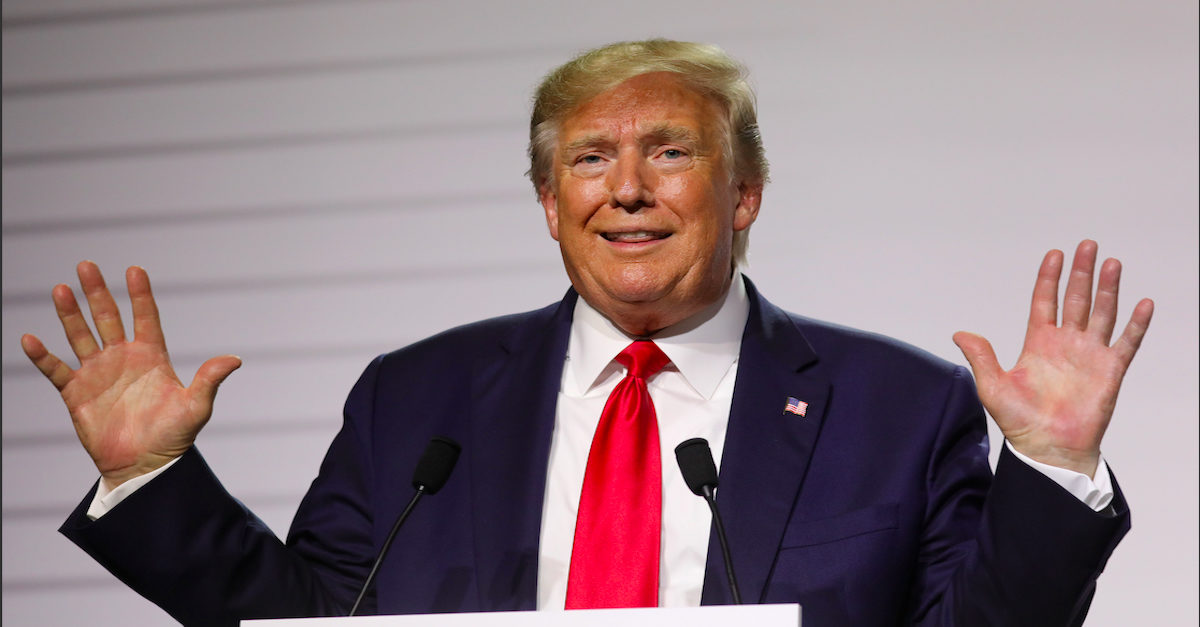
President Donald Trump began the week by breathing new life into an already debunked conspiracy theory claiming that the rules governing intelligence (IC) community whistleblower complaint submissions were changed just prior to the August 12 complaint concerning Trump’s phone call with the president of Ukraine.
“Who changed the long standing whistleblower rules just before submittal of the fake whistleblower report? Drain the swamp,” Trump tweeted in all caps Monday morning.
Trump’s tweet is based on a Friday story from The Federalist’s Sean Davis, which claims that prior to August 2019, IC whistleblowers were required to have firsthand knowledge of the allegations in order to submit a Disclosure of Urgent Concern Form (a whistleblower complaint).
Davis, who has no national security experience and is not an attorney, claimed that “between May 2018 and August 2019, the intelligence community secretly eliminated a requirement that whistleblowers provide direct, first-hand knowledge of alleged wrongdoings,” saying the action “raises questions about the intelligence community’s behavior” regarding the whistleblower. No experts or persons with IC whistleblower experience were quoted in Davis’s report.
The entirety of the claim, which has now picked up steam amongst many on the political right, stems from a misreading of language that appeared in the May 2018 whistleblower submission form which was then removed from the August 2019 version of the form, and specifically pertains to the IC Inspector General’s post-investigation decision regarding the complaint, not the initial submission:
FIRST-HAND INFORMATION REQUIRED
In order to find an urgent concern “credible,” the IC [Inspector General] must be in possession of reliable, first-hand information. The IC IG cannot transmit information via the [Intelligence Community Whistleblower Protection Act] based on an employee’s second-hand knowledge of wrongdoing. This includes information received from another person, such as when a fellow employee informs you that he/she witnessed some type of wrongdoing. (Anyone with first-hand knowledge of the allegations may file a disclosure in writing directly with IC IG.) Similarly, speculation about the existence of wrongdoing does not provide sufficient legal basis to meet the statutory requirements of the ICWPA. If you think that wrongdoing took place, but can provide nothing more than second-hand or unsubstantiated assertions, IC IG will not be able to process the complaint or information for submission as an ICWPA.
National security attorney Mark S. Zaid, one of the lawyers representing the whistleblower in the matter responded to the President’s tweet, stating that there has “never been any requirement that #whistleblowers were required to possess first-hand knowledge to file complaint.”
“No law anywhere states that,” he said.
Zaid’s statement regarding the law is backed up by the DNI’s own website.
Bradley P. Moss, another national security attorney and Zaid’s colleague, had a similar response to the president and those claiming this was evidence of a deep state conspiracy aimed at thwarting the Trump presidency.
“The form does match the law. Neither form differed from the law, the earlier version is being misconstrued,” Moss explained. “The law always allowed the [whistleblower] to only have secondhand info. It just didn’t allow the IG to determine there was an urgent concern based ONLY on secondhand info.”
He also clarified the misconception that the whistleblower form somehow dictated the law regarding whistleblower complaints.
“The submission form is irrelevant to the law at issue. The ICWPA [Intelligence Community Whistleblower Protection Act] never required [whistleblowers] to have firsthand information, nor have any [whistleblower] laws [to my knowledge]. It prohibited the IC IG from making a determination of urgent concern based only on secondhand information,” Moss continued. “All that says on the form is that the IC IG can’t validate a complaint based ONLY on hearsay. The IG didn’t do that. The IG corroborated the hearsay.”
In fact, in his August 26 letter to acting DNI Joseph Maguire, the Trump-appointed IC IG in question, Michael Atkinson, specifically stated that the whistleblower wasn’t a “direct witness” to the president’s phone call. He did say, however, that “Other information obtained during the preliminary review, however, supports the Complainant’s allegation that, among other things, during the call the President ‘sought to pressure the Ukrainian leader to take actions to help the President’s 2020 reelection bid.’”
In other words, Atkinson read the whistleblower complaint, obtained the first-hand information from witnesses to the actual call, then deemed the complaint “urgent” and “credible.”
Matthew Waxman, a former State Department attorney and member of the National Security Council under President George W. Bush who currently teaches at Columbia Law School also weighed in on the President propagating false information.
“The President is assaulting the IC in several dangerous ways. Besides spreading debunked conspiracy theories, a well-functioning whistleblower system is one of the bargains/checks that allows IC to wield enormous and important powers,” he tweeted Monday morning.
2018
ICWSP-Form-401 May 24 2018 by Law&Crime on Scribd
2019
2019 Urgent Concern Disclos… by Law&Crime on Scribd
[image via LUDOVIC MARIN/AFP/Getty Images]